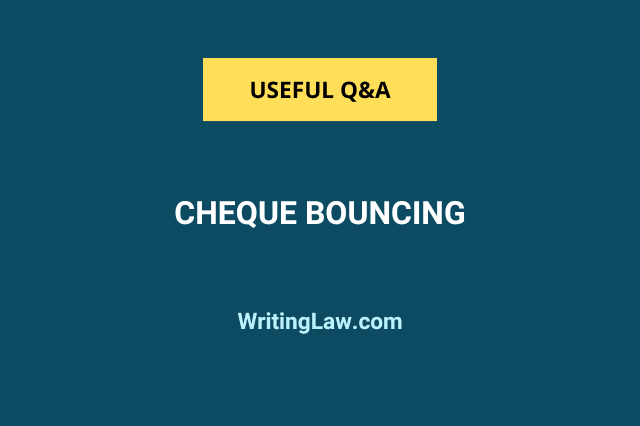
Cheque bouncing, a term familiar to many, encapsulates a series of events that can lead to legal ramifications for the cheque issuer and recipient.
What begins as a routine financial transaction can quickly escalate into a legal dispute, with implications ranging from monetary penalties to criminal prosecution.
This article will briefly discuss section 138 of the Negotiable Instruments Act 1882, which talks about the dishonour of cheques because of insufficient funds in the account.
What Is a Cheque?
A cheque is a written instrument that instructs a bank to pay a certain sum of money from the issuer’s bank account to the person or organisation named on the cheque. It serves as a formal promise of payment.
The person who writes and signs the cheque issuing the payment instructions is known as a drawer. The person or entity to whom the payment is directed and who receives the money from the cheque is known as the payee. The drawee is the bank on which the cheque is drawn.
What Is a Cheque Bounce or Dishonoured Cheque?
Cheque bouncing, also known as dishonoured cheque or bounced cheque, occurs when a cheque is presented for payment to a bank, but the bank refuses to honour it due to insufficient funds in the issuer’s account or various other reasons.
Section 138 of the Negotiable Instruments Act (NIA) is a pivotal legal provision that deals specifically with the offence of dishonour of cheques.
Reasons for the Dishonour of a Cheque
Section 138 of the NIA was enacted to guarantee timely payment to the payee and strengthen the legitimacy of negotiable instruments such as cheques. By making the drawer of a dishonoured cheque criminally liable, it discourages people from issuing cheques with inadequate amounts in the bank account.
Cheques can be dishonoured for various reasons, such as:
- Insufficient Funds: This is the most common reason a cheque bounces. The cheque will be dishonoured if the drawer’s bank account does not have enough money to cover the amount specified on it when it is presented for payment.
- Signature Mismatch: If the signature on the cheque is different from the specimen signature submitted by the account holder to the bank, or if the signature is missing or irregular, the bank may refuse to honour the cheque.
- Mismatched Account Details: If the account number, name of the payee, or other details on the cheque do not match the information held by the bank, the cheque may be dishonoured.
- Frozen Account: In some cases, a bank may freeze a customer’s account due to legal proceedings, debt collection efforts, or suspicion of fraudulent activity. Any cheques drawn on the account will be dishonoured if the account is frozen.
Section 138 of the Negotiable Instruments Act, 1882
Section 138 of the Negotiable Instruments Act regards the dishonour of a cheque as an offence. Accordingly, if a person issues a cheque to discharge a debt or liability, and the bank dishonours the cheque due to insufficient funds or any other reason, he is said to commit an offence.
Upon receiving information about the dishonoured cheque, the payee (the person to whom the cheque was issued) must send a legal notice to the drawer (the person who issued the cheque) demanding payment. Such a notice must be served within 30 days.
If the drawer fails to make payment within 15 days of receiving the legal notice, the payee may file a complaint against the drawer under section 138 of the Negotiable Instruments Act.
The person committing the offence is liable to be punished with up to two year’s imprisonment and a fine, which may be double the cheque amount or both.
- Understanding the Legislative Branch of the Indian Government - 6th May 2024
- Appointment, Oath, and Removal of Constitutional Posts in India - 28th April 2024
- Powers of Income Tax Authorities in India - 26th April 2024







